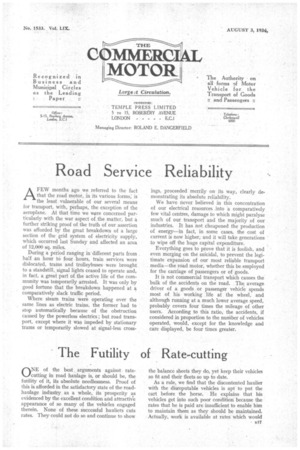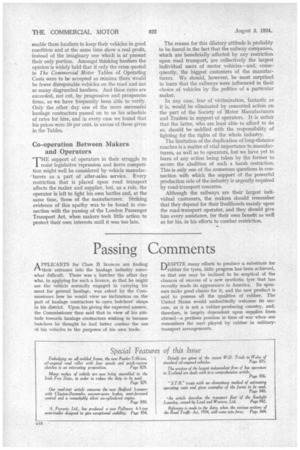The Futility of Rate-cutting
Page 29

Page 30

If you've noticed an error in this article please click here to report it so we can fix it.
(-NNE of the best arguments against rateVa./cutting in road haulage is, or should be, the futility of it, its absolute needlessness. Proof of this is afforded in the satisfactory state of the roadhaulage industry as a whole, its prosperity as evidenced by the excellent condition and attractive appearance of so many of the vehicles engaged therein. None of these successful hauliers cuts rates. They could not do so and continue to show the balance sheets they do, yet keep their vehicles so fit and their fleets so up to date.
As a rule, we find that the discontented haulier with the disreputable vehicles is apt' to put the cart before the horse. He explains that his vehicles get into such poor condition because the rates that he is paid are insufficient to enable him to maintain them as they should be maintained.
Actually, work is available at rates which would enable these hauliers to keep their vehicles in good condition and at the same time show a real profit, instead of the imaginary one which is at present their only portion. Amongst thinking hauliers the opinion is widely held that if only the rates quoted in The Commercial Motor Tables of Operating Costs were to be accepted as minima there would be fewer disreputable vehicles on the road and not so many disgruntled hauliers. And these rates are exceeded, not ciit, by progressive and prosperous firms, as we have frequently been able to verify. Only the other day one of the more successful haulage contractors passed on to us his schedule of rates for hire, and in every case we found that his prices were 50 per cent. in excess of those given in the Tables.
Co-operation Between Makers and Operators
THE support of operators in their struggle to resist legislative repression and fierce competition might well be considered by vehicle manufacturers as a part of after-sales service. Every restriction that is placed upon road transport affects the maker and supplier, but, as a rule, the operator is left to fight his own battles and, at the same time, those of the manufacturer. Striking evidence of this apathy was to be found in connection with the passing of the London Passenger Transport Act, when makers took little action to protect their own interests until it was too late. The reason for this dilatory attitude is probably to be found in the fact that the railway companies, which are beneficially affected by any restriction upon road transport, are collectively the largest individual users of motor vehicles—and, consequently, the biggest custoniers of the manufacturers. We should, however, be most surprised to learn that the railways were influenced in their choice of vehicles by the politics of a particular maker.
In any case, fear of victimization, fantastic as it is, would be eliminated by concerted action on the part of the Society of Motor Manufacturers and Traders in support of operators. It is unfair that the latter, who are least able to afford to do so, should be saddled with the responsibility of fighting for the rights of the whole industry.
The limitation of the duplication of long-distance coaches is a matter of vital importance to manufacturers, as well as to operators, but we have yet to learn of any action being taken by the former to secure the abolition of such a harsh restriction. This is only one of the numerous questions in connection with which the support of the powerful production side of the industry is urgently required by road-transport concerns.
Although the railways are their largest individual customers, the makers should remember that they depend for their livelihoods mainly upon the road-transport operator, and they should give him every assistance, for their own benefit as well as for his, in his efforts to combat restriction.






















































































